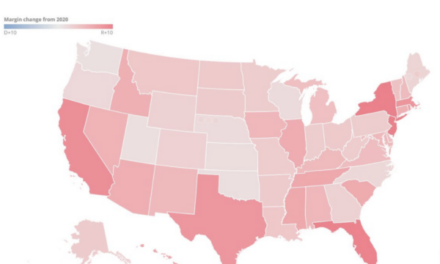We support our Publishers and Content Creators. You can view this story on their website by CLICKING HERE.
Oral argument is underway at this hour at the Supreme Court in the case of U.S. v. Skrmetti, in which the Biden Administration is seeking strike down a Tennessee law restricting transgender treatment of minors. The case will be argued along the traditional lines of whether minors suffering from “gender dysphoria” constituted a “protected class” under civil rights law, and related questions of whether “strict scrutiny” applies, etc.
I’ll leave that to other legal analysts to dissect. But interested readers might wish to take in the Amicus brief filed in the case by the American Principles Project. In addition to arguing the civil rights and scrutiny angles, it also reveals the corruption of the main advocacy organization behind so-called “gender—affirming” care (GAC), the World Professional Association of Transgender Health (WPATH).
From the brief, starting around p. 22:
WPATH itself is a problematic source for standards regarding minor GAC interventions. As one journalist and researcher notes:
“Despite its grand title, WPATH is neither solely a professional body – a significant proportion of its membership are activists – nor does it represent the “world” view on how to care for this group of people. There is no global agreement on best practice … What’s more, NHS England has made it clear that WPATH’s views are irrelevant to its core recommendation that puberty blockers will no longer be available as part of routine clinical practice.”
In fact, NHS has expressly distanced itself from WPATH’s positions, having cited WPATH negatively; i.e., as a group upon which NHS does “not” base its treatment standards: “NHS England does not commission based upon guidelines or treatment protocols eg WPATH 8.0 …” Last, Dr. James Cantor, Ph.D., opines that the WPATH commissioned study failed to study minors’ safety; it contained “discrepancies” and “misleading ambiguities;” and WPATH guidelines are really not “evidence-based” at all.
An earlier amicus brief at the appellate court level was even more blunt about the broader issues. Here’s the able summary:
I. Scientific research shows that children with gender incongruence or dysphoria almost always have significant mental health struggles and adverse childhood events that contribute to if not cause their dysphoria. And multiple studies show that these children almost always grow out of or desist from such gender incongruity while going through puberty.
II. Yet when children are placed on puberty blockers and/or cross-sex hormones, they almost always proceed to “gender transition” surgeries with life-long adverse consequences. Just as alarming is that these children—often 11 years old or even
younger—are incapable of making such life-altering decisions.When it comes to puberty blockers, cross-sex hormones, and “gender transition” surgeries, moreover, there are no long-term, reliable studies on the benefits from starting a child on this pathway. What is known is that children show minimal mental health improvements in the short-term and significant mental health issues in the long-term. It is also clear that such hormonal and surgical interventions do nothing to treat the underlying mental health struggles these children face, even as the “treatments” themselves create severe adverse health consequences. . .
III. Tennessee’s law is also consistent with sound medical practice: Rather than push a pre-teen to drugs and permanent body-altering surgery, the appropriate medical treatment is to address the child’s underlying mental health issues while allowing the child to go through natural puberty. That is what their bodies were meant to do. And, upon reaching adulthood, the vast majority of children who were not “affirmed” in a gender-incongruent identity will no longer feel any distress in their sex. And there is no way to know whether a child aged eleven is going to be the exceptional case of someone who doesn’t simply “grow out of” his or her adolescent gender dysphoria.
Later in the brief, guess who shows up:
As for WPATH, leaked emails reveal that, during the preparation of the current version of its Standards of Care (SOC 8), HHS officials in the office of Rachel Levine, HHS Assistant Secretary for Health, and the Administration’s most prominent transgender person, successfully directed WPATH (over WPATH member objections) to remove all age limits from SOC 8 because HHS feared any age limits could support state laws restricting gender-transition procedures for minors. These emails show that Levine spoke to WPATH and was “very eager for [the SOC 8 guidelines’] release—so to ensure integration in the US health policies of the Biden government.” WPATH emails show that WPATH complied with HHS’s charge: “[W]e heard your [Dr. Levine’s] comments regarding the minimal age criteria for transgender healthcare adolescents; the potential negative outcome of these minimal ages as recommendations in the US [* * *] Consequently, we have changes to the SOC 8 in this respect.”
Similarly, emails revealed that WPATH commissioned studies from Johns Hopkins University and then attempted to stop Johns Hopkins from publishing its findings because the studies found little to no evidence about transitions for children and adolescents. WPATH thus pushes a narrative, not the medically appropriate treatment for minors. Indeed, with its membership plummeting and its abandonment of evidence-based guidelines, WPATH has been discredited as a medical organization.
See also APP’s report, “The Gender Industrial Complex.”
Let’s hope Justice Gorsuch doesn’t go wobbly on this case as he did in Bostock.
P.S. Check out who the Biden Justice Department is sending in to argue the case against the Tennessee law.

 Conservative
Conservative  Search
Search Trending
Trending Current News
Current News 




